CREATING BLACK SPACES



























































Businesses must be intentional in creating welcoming spaces for Black people, experts say. In the meantime, the Triangle’s Black residents rely on businesses and services—some decades old—specifically created for them.













 By Jasmine Gallup, p. 8
By Jasmine Gallup, p. 8



























 Raleigh | Durham | Chapel Hill
February 22, 2023
Raleigh | Durham | Chapel Hill
February 22, 2023
Raleigh W Durham W Chapel Hill
VOL. 40 NO. 8
CONTENTS
8 Experts say businesses need to be intentional in making Black patrons feel welcome. Meanwhile, spaces in the Triangle created by and for Black people continue to thrive.
BY JASMINE GALLUP
10 A Democratic Party activist and former organizer discusses party workers' efforts to form a union.
BY LENA GELLER
12 Numbers of children placed in foster care in Durham County are rising, as numbers of children returned to their families fall. One mother shares her harrowing story. BY
THOMASI MCDONALD
ARTS & CULTURE
14 At Hank's Downtown Dive and Sidecar, in Cary, the legacy of the illustrious jazz bar C Grace lives on.
BY JASMINE GALLUP
15 "In writing the libretto, she really found the heart of his story," Michael Abels says of his collaborator, Rhiannon Giddens, who he wrote the historical opera Omar with.
BY BYRON WOODS
16 Elegies for the Drift, Joe Westerlund's new album, is a meditation on grief and the ways we pay tribute to those we've lost.
BY DAN RUCCIA
18 To create his new project, Warka, Chapel Hill's Jesse Ainslie took a long look back at history.
BY NICK MCGREGOR
W E M A D E T H I S
PUBLISHER
John Hurld
EDITORIAL
Editor in Chief
Jane Porter
Managing Editor
Geoff West
Arts & Culture Editor
Sarah Edwards
Staff Writers
Jasmine Gallup
Thomasi McDonald

Lena Geller
Copy Editor
Iza Wojciechowska
Interns
Sarah Innes, Nathan Hopkins
Contributors Spencer Griffith, Brian Howe, Kyesha Jennings, Jordan Lawrence, Glenn McDonald, Nick McGregor, Gabi Mendick, Shelbi Polk, Dan Ruccia, Rachel Simon, Byron Woods
CREATIVE
Creative Director
Nicole Pajor Moore
Graphic Designer
Izzel Flores
Staff Photographer
Brett Villena
Switchyard Theatre Company's Present Laughter shows at the Durham Arts Council from February 23 to March 5. (See calendar, page 20.)
ADVERTISING
Publisher
John Hurld
Sales Digital Director & Classifieds
Mathias Marchington
CIRCULATION
Berry Media Group
MEMBERSHIP/ SUBSCRIPTIONS
John Hurld
INDY Week | indyweek.com
P.O. Box 1772 • Durham, N.C. 27702
Durham: 320 East Chapel Hill Street, #200
Durham, N.C. 27701 | 919-286-1972
Raleigh: 16 W Martin St, Raleigh, N.C. 27601
EMAIL ADDRESSES
first initial[no space]last name@indyweek.com
ADVERTISING SALES
advertising@indyweek.com
Raleigh 919-832-8774
Durham 919-286-1972
Classifieds 919-286-6642
Contents © 2023 ZM INDY, LLC
All rights reserved. Material may not be reproduced without permission.
2 February 22, 2023 INDYweek.com NEWS
COVER (Left) The Raleigh branch of Mechanics and Farmers Bank opened at 13 E. Hargett St. in 1923. Image via Wikimedia Commons. (Right) The rebuilt N.C. Mutual Life Insurance Co. building at 116 W. Parrish St. in Durham. Image courtesy of Durham County Library Archives
THE REGULARS 3 Backtalk 4 15 Minutes 5 Op-ed 6 Quickbait 20 Culture Calendar
PHOTO COURTESY OF DURHAM ARTS COUNCIL
Last week for print, Jasmine Gallup wrote about the City of Raleigh’s plan for community engagement and its decision to bring back CACs after the council voted abruptly to disband the neighborhood groups three years ago. STEF MENDELL , a neighborhood activist and former District D city council member, sent us a response to our story via email:
Thanks for covering the ongoing saga about CACs.
A few points of clarification:
1. “… many continue to criticize the three-minute time limit for all public comments.”
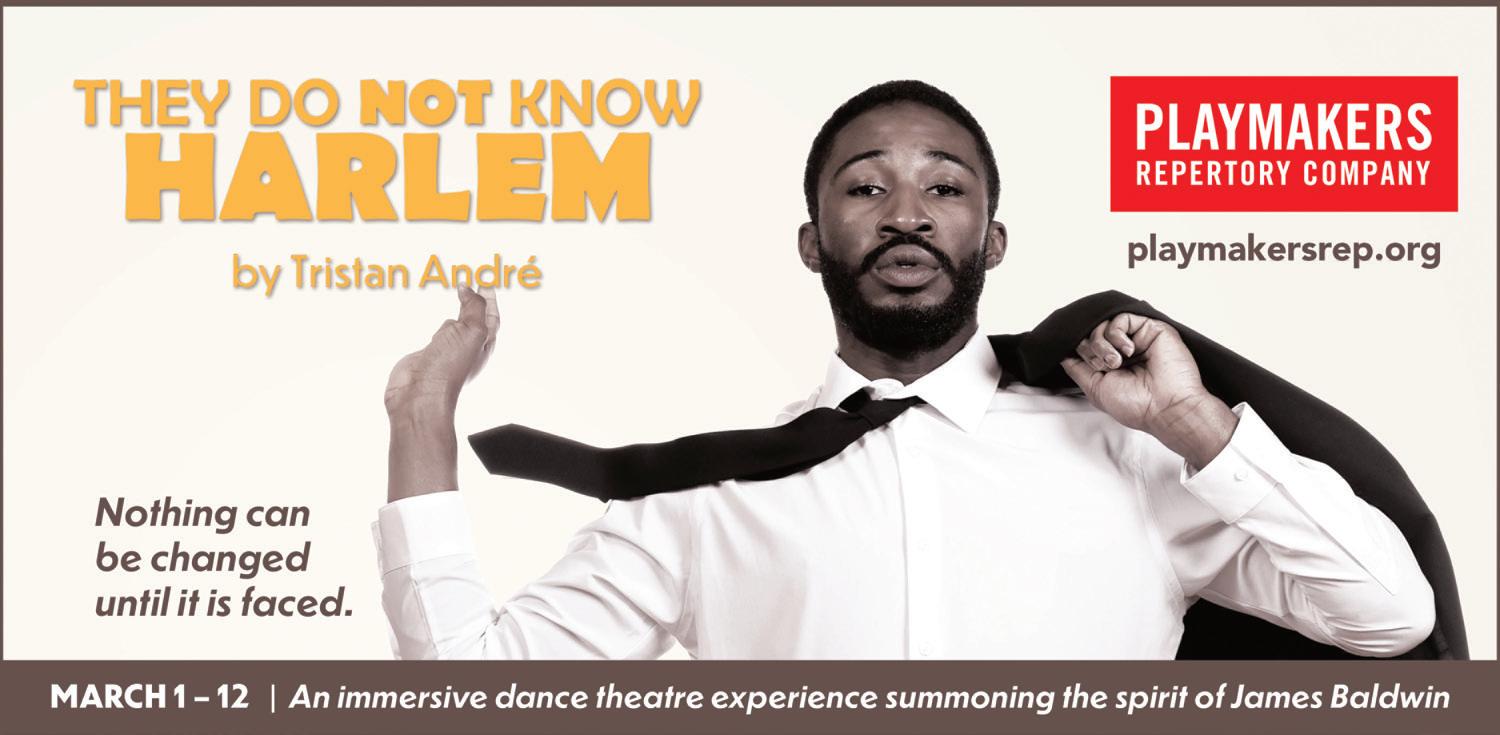
Speakers don’t have a problem with the three-minute time limit. The problem is when the Mayor cuts the time back to two minutes, or even one minute, as she has repeatedly done over the past three years.
2. “… hosting regular meet and greets between residents and city departments that offer services …”
mation they need instead of filling up calendars with multiple meetings with each of these departments.
3. “The community engagement department is asking for enough funding …”
The City was getting a real bargain through the previous CAC model, but now the Community Engagement Department is requesting a lot of resource to do essentially the same job. This in a time when there are other pressing priorities (housing, first responder and other City staff pay, stormwater issues, road repairs, etc).
Bottom line
1. CACs were defunded on February 4, 2020, because developers didn’t want to have to interact with residents and developers bought 7 of the 8 seats on the council that was elected in 2019.
2. It’s important to note that CAC votes were NOT binding on Council, just as Planning Commission recommendations are NOT binding.
WANT
indyweek.com
backtalk@indyweek.com
@INDYWeekNC @indyweek
The best way to accomplish that goal was, as was past custom, to have those groups present at CAC meetings. That way residents can go to one meeting a month and get all the updates and infor-
If the City had only been responsive to the previous requests from CACs for some minimal additional support to improve outreach, this wouldn’t be necessary.
3. It’s also important to note that, while one of the pretenses for defunding CACs was that they were not diverse enough, about half of the 18 CACs were in minority neighborhoods and led by people of color. The CACs that continued to function after February 4, 2020, were largely in white neighborhoods. With their action three years ago, the Council disenfranchised the very population they allegedly were advocating for.
3 February 22, 2023 INDYweek.com
TO SEE YOUR NAME IN BOLD?
B A C K T A L K
Wka e up withus
BY SARAH INNES backtalk@indyweek.com




What first inspired you to get into filmmaking?
I started off working with the Full Frame Documentary Film Festival in Durham doing various roles. I really enjoyed the festival experience and I’ve always loved horror movies, so I reached out to the folks working at Nevermore Film Festival, which is produced by the Carolina Theatre in Durham. I then got involved with another horror film festival—the Nightmares festival in Columbus, Ohio.
All of these years being around filmmakers and curating indie films really made me interested in getting involved in filmmaking. I really wanted to get some behind-thescenes experience and see what it was like being on set and seeing the nuts and bolts of how a film comes together. I reached out to Chris McInroy when he started working on GUTS back in 2021.
Can you tell me a bit about the creation of GUTS?
Chris McInroy—the director and writer of GUTS—had created several short films prior to that; I had seen his films coming up every year [at film festivals] and thought, “This guy is great!” A lot of short filmmakers are kind of one-and-done, but he came back year after year with these great shorts that perfectly balanced the horror-comedy element that I love.
It was the middle of the pandemic and he had a new short film that he was going to try to make. I saw his Kickstarter and thought I would love to have that on-set experience. I reached out to him and said, “I’d love to be a part of this. I don’t know what I can bring to the table really because I don’t have any filmmaking experience, but I’d love to see how the process all unfolds.”
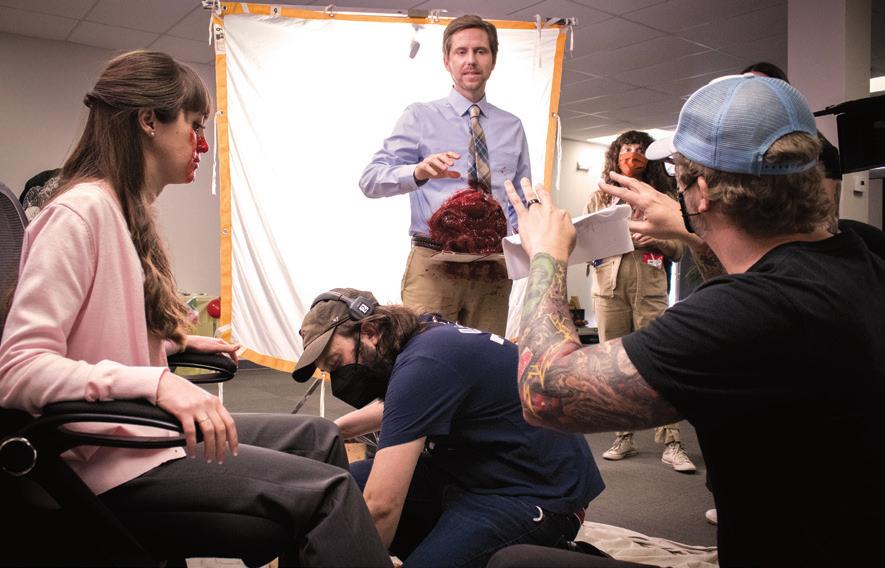
When did you learn that GUTS was nominated for Fangoria Chainsaw’s new short film category?
We learned about it as we were nominated and the new category was announced. We didn’t know anything about it before that. I got a text from Chris McInroy saying “Holy shit. We got nominated for a Fangoria Chainsaw award!” It’s crazy to be nominated alongside the likes of heavy hitters like Nope, The Black Phone, Barbarian , and other box office hits. I looked and realized the reason it hadn’t even been on my radar is that they had never given awards for shorts before. It’s the first year they’ve expanded that category, and it’s really cool to see that they’re looking at short films as another area of recognizing talent.
Can you tell me about your new short premiering at Nevermore?
That’s another short written and produced by the same team as GUTS called We Forgot About the Zombies. It’s very short—just about four minutes long. We filmed it this past summer and it’s on the festival circuit right now. Its North Carolina premiere is here at Nevermore (February 24-26, 2023) and it’s also playing at South by Southwest at their Midnight Shorts block.
There seems to be a history of the public misunderstanding the horror genre—are we moving away from that?
For many years, horror has been the underdog genre of the industry, and now it’s finally having its moment. In a sense, horror is still misunderstood.
It’s like an amusement-park-ride high—you get really anxious as you ramp up, and then there’s that climax and release. It all unfolds in this safe cinematic experience. I feel like some of that even comes from a place of anxiety: the real world is so scary all the time, and if you can submerge yourself in this scary zone within a safe place, it’s a really exhilarating experience. W
This interview has been edited and condensed for clarity. Visit our website to read the extended version of this article.
4 February 22, 2023 INDYweek.com
Local news, events and more— in your inbox every weekday morning Sign up: INDY
SIGN UP FOR THE
DAILY
Raleigh
Left: On the set of GUTS. Right: Stacey Bell. PHOTOS COURTESY OF THE SUBJECT
Stacey Bell
Executive producer of the new short film GUTS
15 MINUTES
Stacey Bell. THE SUBJECT produced We Forgot short—just about this past circuit right is here at 2023) and it’s Southwest at their history of misunderstanding the moving away been the and now a sense, high—you up, and release. It all experience. I comes from a is so scary submerge within a safe experience. W and webversion
Why I Run
Reflections on a recent congressional campaign
BY NIDA ALLAM backtalk@indyweek.com
There’s a corrosive idea in politics that young candidates should “wait their turn.” Change happens incrementally, the theory holds—and we ought to defer to older issues, older tactics, older leaders, before even thinking about raising our own hands.
But when I look back at my decision to run for Congress, I truly believe there was no time to wait. If anything, I think: “What took you so long?”
My community, my gender, and my generation don’t have the luxury of waiting to be handed a seat at the table. We’re already facing a torrent of regressive sexism that’s rolled back our right to choose; we’re already living with the deadly consequences of climate change. And I spend every single day wondering if my friends

Deah, Yusor, and Razan would still be alive if only more of our elected officials had been willing to stand up against pervasive post-9/11 Islamophobia.

For candidates like me, the decision to run for office isn’t about a title or a pension package; it’s about survival. It’s a simple choice between trying to fight and living in fear.
Still, while I have no regrets about running to serve my NC-04 community, the campaign itself wasn’t always easy. And rather than keep those challenges to
myself or pretend I’m not human like anyone else, I think it’s important to demystify the process of running for office—so that more young candidates know exactly what it takes.
Of course, there’s the personal stuff: The financial strain of running for office takes a toll on all working- and middle-class candidates, and leaving my job while my husband Towqir was a full-time student made it particularly hard for my family. On top of that, campaigning while pregnant came with its own set of obstacles. I often found myself worried that the stress would have an adverse impact on my health or our baby’s. I was so lucky to have a vast community across Durham who came together to support us in the toughest moments—bringing meals, checking in on my mental health, and celebrating campaign milestones.
The truth is, this race wasn’t just personal for me. It was personal for hundreds of people across NC-04. And so, the most painful part of running wasn’t the financial or emotional strain—in reality, it was seeing the vicious Islamophobia that hurt so many in our community. When dog whistles like “radical” and “extremist” were slung at my campaign—terms that echo similar attacks on Representatives Rashida Tlaib and Ilhan Omar—the intent
behind them was clear as day. Those who use them want Muslims to live in fear—to walk on eggshells in the simple act of our own self-expression.
Worse still was witnessing the silence of elected officials and my fellow Democrats—even self-described allies—in the face of these attacks. Some minimized the Islamophobia, claiming that we made “something out of nothingburger.” Others chose to say nothing at all. In either case, the campaign revealed the entrenched nature of Islamophobia in our politics— and ultimately, made me more determined than ever to fight it.
Doing so will take political courage, yes; but also, money. In 2022, after the multimillion-dollar primary, financial investments in NC-04 dried up, seemingly overnight, support for down-ballot candidates disappeared, leading to critical losses in places like Alamance County, where former NC House Representative Ricky Hurtado could’ve kept his seat with more investment and support.
In spite of it all, nothing made me happier or more hopeful than seeing the joy that our campaign inspired. Young people, including so many first-time voters, drove the excitement around my candidacy from start to finish. Their passion and energy gave me not just the motivation to keep going but the material support
to maintain a highly organized campaign: young people coordinated voter outreach on their campuses, they got their classmates to vote in the primary and to phone bank, and they made sure that our campaign reflected their values and priorities. And every time I think of my daughter Aaliyah, and the world I want her to grow up in, I feel reaffirmed in my decision not to “wait my turn.”
After all, as Dr. King wrote in his infamous Letter from a Birmingham Jail, when powerful people tell us to wait, they almost always mean “never.” And lucky for me and Aaliyah, this movement was never about just one campaign—or one person. It’s about a generation of young people, women, Muslims, people of color, and hardworking North Carolinians of all backgrounds who are tired of living in fear and silence. Change can’t wait, and we shouldn’t let it.
In the next election cycle and many to come, I hope every progressive candidate who’s wondering whether it’s their time feels empowered to raise their hand, whatever the obstacles. There’s a whole movement of us coming, and it’s about time we entered the race. W
5 February 22, 2023 INDYweek.com
O P - E D
“I think it’s important to demystify the process of running for office—so that young candidates know exactly what it takes.”
Nida Allam is a Durham County commissioner and former candidate for North Carolina’s 4th Congressional District.
Nida Allam. PHOTO BY JADE WILSON
Black Entrepreneurship
BY JASMINE GALLUP jgallup@indyweek.com
Black-owned businesses across North Carolina were on the rise as of 2020, according to the U.S. Census Bureau. At the start of the COVID pandemic, from 2019 through 2020, the percentage of Black-owned businesses in the state increased and made up about 4% of all North Carolina businesses by the end of the year. In most industries, Black ownership is still scarce, however. Banks, retailers, and some healthcare services are mostly white-owned.
Nationwide
2.4% 2.4% of all businesses are Black-owned
140,918 Black-owned businesses
$141.1 BILLION in annual receipts
1.3 MILLION employees
$42.2 BILLION in annual payroll
27.5% in Healthcare and Social Assistance sectors
North Carolina
3.8% 3.8% of all businesses are Black-owned
RETAIL
1.3% of food services and drinking places are Black-owned
(includes restaurants and coffee shops)
HEALTHCARE
10.3% of healthcare and social assistance businesses are Black-owned
(includes hospitals, doctor/dentist offices, nursing homes, and social services)
FINANCE
<0.02% of credit/lending sector workforce employed by Black-owned businesses
REAL ESTATE
1.6% of the real estate sector workforce employed by Black-owned businesses
Source: U.S. Census Bureau
6 February 22, 2023 INDYweek.com QUICKBAIT
Best Triangle 2023 of the
Wake County
The most recognized award throughout the Triangle is back for 2023—
STARTING WITH WAKE COUNTY!
Vote for your favorite Wake County bar, veterinarian, bookshop, museum—whatever it may be, there are over 100 categories in which you can profess your favorite Wake County treasures. Have no fear: Durham and Orange/Chatham Counties will have their own nominations soon. W
FINAL VOTING OPENS
WEDNESDAY, MARCH 8 TH
7 February 22, 2023 INDYweek.com
VOTE.INDYWEEK.COM
a k e C o u n t y
Creating Black Spaces
Businesses must be intentional in creating welcoming spaces for Black people, experts say. In the meantime, the Triangle’s Black residents rely on spaces—some decades old—specifically created for them.
BY JASMINE GALLUP jgallup@indyweek.com
In the heart of downtown Raleigh, across from a bustling outdoor café, there’s a blocky, inconspicuous concrete building that’s sat on the corner of East Hargett Street for a century. Inside, it’s quiet. A few bank tellers answer phone calls and serve customers behind a large granite countertop. The manager sits in her office, meeting with hopeful entrepreneurs.
The Raleigh branch of Mechanics and Farmers (M&F) Bank, which opened in 1923, wouldn’t be unique among city businesses, except for one thing: M&F Bank is one of the few Black-owned financial institutions in North Carolina, where clients can deposit money and secure loans free from the threat of racism that has plagued financial and other institutions.
Today, even as many businesses try to become more diverse, equitable, and inclusive, welcoming spaces for Black customers can be rare. Often, African Americans who are simply going about their days, grocery shopping or eating at a restaurant, are approached by security guards who question their presence or employees who ask, with a hint of challenge, “Can I help you?” Who can forget the 2018 arrests of two innocent Black men at a Philadelphia Starbucks, a business well known for allowing patrons to linger?
The Triangle is no different. While there are some spaces that seem open to Black residents, others still seem off-limits, a remnant of the racial segregation that dominated the United States for more than 100 years.
“Racism is such a scavenger ideology,” says Lee Baker, a cultural anthropology professor at Duke University. “One of the places we’ve seen it the most is in the schools. The schools have almost resegregated.”
“On the other hand,” he continues, “it is so nice to be able to walk into an Applebee’s in Raleigh, Durham, even Chapel Hill, and you’re like, ‘Wow, this is the community I live in.’ Same thing if you walk into Food Lion.”
From Baker’s perspective, many of the most popular businesses in the Triangle have a diverse customer base— places like Biscuitville, Angus Barn, and many historically Black churches, Baker says. But he also sees spaces that are “white white,” in his words, like Whole Foods, “chic” boutiques, or some vegan restaurants.
The racial barriers here are hard to see—they can be social or cultural, Baker says. One of the things that can lower those barriers is intentionality, he says. Business owners and managers have to work hard to diversify staff and customers.
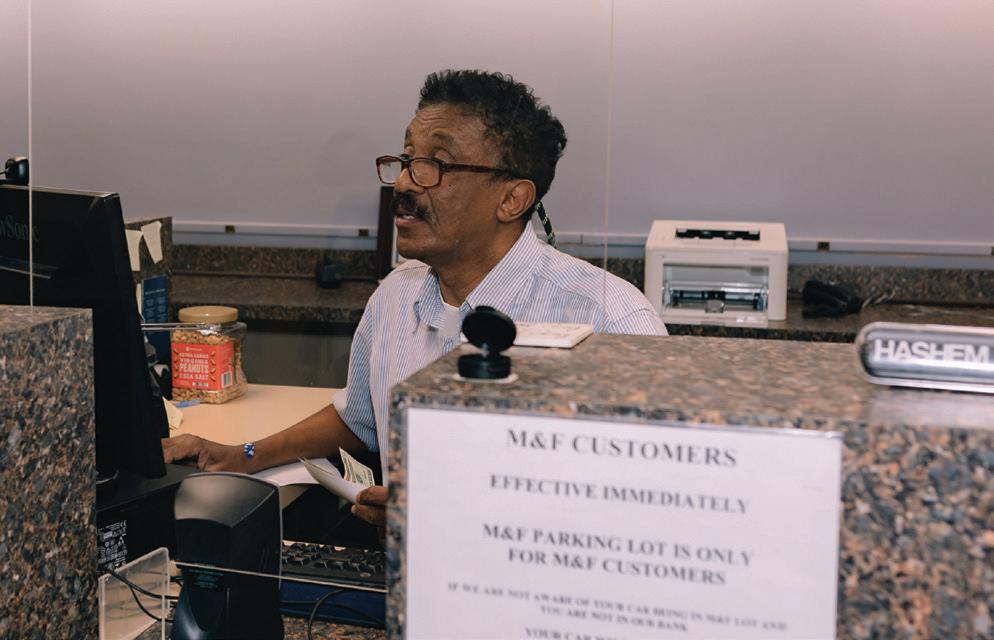
Historically, some of the highest racial barriers can be found at banks and hospitals. So this month, INDY Week talked to people in those industries who are intentionally carving out spaces for the Triangle’s Black community.
Finance
In 1907, the United States was segregated, lynchings were common, and most Black residents had lost their right to vote through a combination of poll taxes and literacy tests. The once thriving Black middle class was on the decline.
In the middle of this nadir of race relations, when members of the Ku Klux Klan were marching in the streets, M&F Bank was founded in Durham.
With Black North Carolinians barred from “white-only”
banks, M&F was one of the few places they could manage money and build wealth. Founded by nine prominent Black businessmen—including NC Mutual founder John Merrick, NC Central University founder James Shepard, and brick manufacturer and later bank president Richard Fitzgerald—the bank quickly became a cornerstone of Durham’s Black Wall Street.
“We always let [customers] know where we started and why,” says Jumeekah Ingram, the manager of M&F Bank’s Raleigh branch. “Black individuals, we didn’t have a place to put our money or to get a loan. That’s where it all started, on Black Wall Street in Durham.”
Today, M&F Bank’s mission is the same. Namely, to support Black-owned businesses and make loans to people for things like home repairs, medical bills, or the purchase of a car. In 2021, during COVID, the bank issued about $35 million in Paycheck Protection Program (PPP) loans, to help businesses keep paying their employees during shutdowns.
“We saved 3,000-plus jobs,” said James Sills, president and CEO of M&F Bank, in an interview with the Federal Deposit Insurance Corporation. “Sixty-five percent of those [businesses] were minority-owned. So that’s how I know we’re making a difference every single day.”
In finance, trust can be a hard thing to come by. A lot of people—even those who haven’t been historically excluded from financial opportunities or disproportionately affected by financial crashes—avoided banks after the Great Recession. So for Ingram, listening to customers and responding to their needs is the most important part of the job, she says.
“When you bank with Mechanics and Farmers, you’re
8 February 22, 2023 INDYweek.com N E W S Wake County
Hashem Edris, a teller at Raleigh’s M&F Bank
PHOTO BY BRETT VILLENA
not a number,” Ingram says. “[You’re] family.”
The truth of that statement is evident. When you call the bank’s Raleigh branch, you don’t get an automated response, you get Amy, a customer service rep who’s been working at the bank for nearly 25 years. When one customer walks in the door, Ingram is quick to greet him by his name.
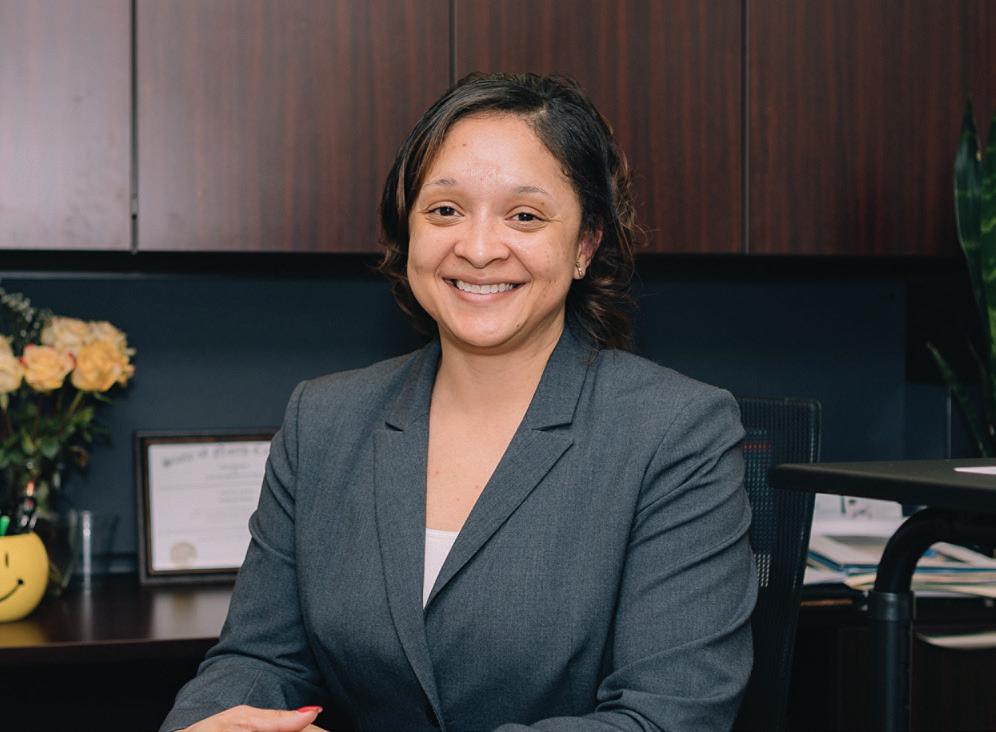
“How are you doing?” she asks. “How’s the baby?”
Regular customers of M&F Bank often have parents or grandparents who banked with the institution, Ingram says. Years later, they may bring their children in to start their first savings account.
“It gives [people] joy, confidence, knowing they can rely on a financial institution that will stick by them, be responsive to their needs, and be enthusiastic about them as well,” Ingram says. “To see someone bringing their child to open up their savings account … you’re instilling in them, at that moment, financial literacy. When back in, you know, 100-plus years [ago], we didn’t have that.”
Health care
In North Carolina, as in many other states, African Americans face much higher rates of illness and death than their white counterparts.
From 2012 to 2016, African Americans died from diabetes at more than double the rate of white people, according to NC Department of Health and Human Services. In 2016, about 11 percent of African Americans went without health insurance, while about 9.2 percent of white people went without health insurance. And from 2013 to 2016, Black mothers died at nearly double the rate of white mothers.
For Alicia Taylor, the founder of Zebulon Birth and Wellness, this isn’t news. Taylor, who is a birth and postpartum doula as well as an infant feeding specialist, works with pregnant people to create birth plans, make prenatal decisions, and advocate for their needs in the hospital.
“One of the things we ask about is ‘What are your goals for your labor experience?’ And oftentimes one of the first things they say is, ‘I just don’t want to die,’” Taylor says. “It’s a very real possibility, with the rates that are out there.”
Taylor had her own uncomfortable experience in the hospital when she gave birth to her first child. When doctors told her they needed to “get the labor going a little bit more” with hormone medication, Taylor was hesitant.
“I was all for [inducing labor], but I did say, ‘Hey, I’m a little sensitive [to hormone medication], so maybe we can start with the half dose.’ And the nurse looked at me and said OK and then proceeded to give me the normal amount,” Taylor says. “I think my labor experience would have been very, very different had they listened in that instance.”
Stories of doctors overlooking or simply ignoring Black women when they say something is wrong are prolific. And when doctors do dismiss those warnings, “it leads to consequences for the mother and baby,” Taylor says.
“The implicit or explicit bias of the medical provider
sometimes plays a role in whether they’re able to access the ability to hear [patients], to really understand that something is wrong and it needs attention.”
Much of Taylor’s job involves educating pregnant people on the birth process.
“Knowledge is power,” she says. “So we do a lot of education on the front end before we even get to labor … so that when you are there, you have an understanding of what’s happening. You have an understanding of what your options are.”
With her knowledge of the labor process, Taylor can help cut through medical jargon and explain what doctors are recommending. She also helps amplify her clients’ voices during labor, so they can get their questions answered and make their wishes heard.
“Once we get to delivery day, we are a sounding board to help them make decisions and birth from a place of confidence,” Taylor says. “It’s really a personal experience, and doctors and nurses aren’t always able to take the time to really flesh out a decision, the pros, the cons. … But a doula can, that’s what we’re trained to do. It’s like we have this magical power to stop time.”
For Taylor, the most important part of her job is being there for her clients—through pregnancy, through birth, and through new motherhood in the role as a friend, an expert, and an extra pair of hands. She wants to make sure new mothers know they’re not alone. If they have to throw up their hands and walk away from their baby, “I’m not judging you,” Taylor says.
Ultimately, Taylor’s not just carving out space for Black women in the hospital, she’s helping them create space for themselves in their own homes. Space to feel joyful, overwhelmed, and even sad about motherhood, without feeling guilty.
“I can’t describe the feeling of gratitude I have to be a part of birth stories, and to be a part of families starting off in such a good place, feeling empowered,” Taylor says. “You don’t want to work yourself out of a job, but it is really joyful for me when I do, because that means this family has confidence in their own ability. They are aware that they can do hard things. Labor and parenting is hard, but they can do it.” W
9 February 22, 2023 INDYweek.com
“Knowledge is power ... so when you are here, you have an understanding of what’s happening. You have an understanding of what your options are.”
Alicia Taylor, founder of Zebulon Birth and Wellness PHOTO BY BRETT VILLENA
The State of the Union
A Q&A with a Democratic Party activist and former organizer, who was part of the push for union protections for party staff during the past election cycle
BY LENA GELLER lgeller@indyweek.com
Last week, Michael Careccia took to Twitter to drum up support for an employer who had, less than two months earlier, laid him off in a manner reminiscent of the way I was dumped by my high school boyfriend: unceremoniously, in the parking lot of a gas station, and after repeated assurances, in weeks prior, that the relationship was stable.
Given the circumstances, Careccia’s tweet—which called for monetary donations to his former employer, the North Carolina Democratic Party (NCDP)—might have been peculiar if not for the momentous change that spurred it.
His post came several hours after party members rejected the establishment-backed incumbent chair, former state representative Bobbie Richardson, in favor of Anderson Clayton, a 25-year-old Person County native whose fresh perspective and urgent optimism rang true with a party reeling from its November losses.
The win, Careccia says, has restored his faith in what he feared was a sinking ship.
Careccia, who lives in Lenoir, has been rallying Democratic voters in the western part of North Carolina for years, but he didn’t start getting paid for his efforts until April 2022, when the NCDP brought him on as a regional organizing director (ROD).
He was one of seven RODs recruited to staff Building Blue, a brand-new program intended to provide year-round training and assistance to county parties around the state. Careccia was stationed on his home turf, between Boone and Forsyth Counties.
About a month after Careccia was hired,
a fellow ROD asked him if he’d like to sign a union card. A handful of staff members had reached out to the Campaign Workers Guild—a national union that represents party workers across the country—and succeeded in obtaining a representative, the ROD told Careccia. If enough staffers signed cards, they could go to NCDP management and ask for union recognition.
Careccia—who had spent the previous several years attempting to organize his coworkers at Walmart and Bargain Hunt—was jazzed. He signed on, as did about 90 percent of the other year-round staff members.
And so began a tumultuous six months in which Careccia says NCDP leadership took actions to dissuade staff members from organizing and strategically shut RODs out of union negotiations before terminating the Building Blue program in December.
In the wake of the recent chair election, the INDY spoke with Careccia—who currently serves as the vice president of development at Young Democrats of North Carolina—to learn more about his experience trying to unionize under former leadership and to hear why he thinks things might play out differently in the future.

NCDP declined the INDY’s request for comment on this piece.
INDY Week: Why did you and other NCDP workers want to unionize? What were your demands?
Careccia: Some staff members were looking at how other states have a 401(k) plan, and we do not, whereas other members were concerned about the pay
gap between management and the lowest-paid staff member.
One of the other big issues that we wanted to discuss at the table was changing the culture. North Carolina is a hard place for workers to get the respect and rights that they deserve. But the NCDP is supposed to be a major megaphone for those people.
How did NCDP leadership respond to your unionization efforts?
The first thing we needed to do was reach out to management and give them the opportunity to voluntarily recognize our union. We ended up extending the deadline [for them to respond] two or three times. A few months later, we got a response—not from our executive director but from the legal counsels. The legal team claimed that the RODs were attempting to form an illegal bargaining unit and were not eligible to be protected under the union because we were “intended to one day be in supervisory roles”— even though we did not hold supervisory positions at the time.
During that time, there were talks about shifting the Building Blue RODs over to the coordinated campaign, [a get-out-thevote initiative] which comes in during the election cycle and then leaves. The idea was to temporarily make us supervisors—
which we took immediately as union busting. We addressed our concerns with management and with legal, and we wound up coming to a verbal agreement that we would be recognized as part of the union in November, when we shifted from the coordinated campaign back to our Building Blue positions after the election.
[During the months that the RODs were working on the coordinated campaign], we couldn’t be at the bargaining table, but we were hearing from the staff members who were. One of the deputy directors was given an ultimatum: you either drop trying to organize or you take a demotion. Things really started to heat up. Directors were following staff members to the bathrooms. They would say things like, “I’m your friend, I care about you. Why would you try to push against me on unionizing?”
All these intimidation tactics.
And the unit started to run into issues with regressive bargaining, which is where both parties have tentatively agreed on an article and [the employer] changes the article later on without a mutual agreement. So [the bargaining unit] submitted an unfair labor practice to the [National Labor Relations Board]. The deal was that if [NCDP] retracted their regressive bargaining, [the unit] would retract their unfair labor practice. And that did wind up happening.
10 February 22, 2023 INDYweek.com N E W S North Carolina
Michael Careccia PHOTO COURTESY OF THE SUBJECT
union bustwith manwe wound that we the union from the Building RODs were campaign], we table, but members directors was drop trydemotion. up. Direcmembers to the like, “I’m Why would unionizing?”
into issues is where agreed on an the artiagreement. So an unfair Labor Relaif [NCDP] bargaining, [the labor prachappening.

What happened after the November election?
The following Monday, we were told that we were not being laid off, and that we could continue our work with Building Blue. Then, a day or two later, we were told that we had six months to prove ourselves, to prove that the Building Blue program was something worth funding. Throughout November, they told us that on a daily basis: Six months. We have six months.
In December, I got approved for vacation time to go up to Buffalo for a Young Democrats convention. I got to West Virginia and wound up getting a text message asking me to hop on Zoom for an all-staff meeting. I was kind of reluctant at first, because I was like, “I’m on vacation,” but I’m also the type of person that doesn’t like to miss anything. I decided that I could just sit on Zoom while driving. But when I hopped on the call, I realized very quickly that I needed to park, because this was not an all-staff meeting: it was just Building Blue RODs, our supervisor, and the party’s adviser. They told us that we were being laid off.
And here’s the best part: while we were being laid off, they told us that we would be paid through the end of the month, as per the union contract. That’s the point when we realized that we were, in fact, covered under the union. It was never told to us until that very moment. Remember, we had that verbal agreement with management about getting union recognition after the election, but we’d been waiting to have the conversation because we were still catching up on sleep and we wanted things to be as smooth as possible.

There were a total of nine staff members who were laid off that day. All nine were members of the union.
How did you feel during that Zoom call?
We were all stunned. We were absolutely blindsided. I had made a dentist’s appointment for the beginning of January, but my insurance would be gone by the end of December. There was a staff member who had waited to pay some large expenses— something like buying a car or making a down payment—until after the election, when we were told we would be employed for at least six more months. For that person to be told, a few weeks later, that they were out of a job—it was devastating.
Is your sense that the dismantling of Building Blue was related to your organizing efforts?
There is no doubt in my mind.
Do you see a connection between this series of events and how badly the elections went for Democrats in North Carolina?

I think to some degree, there is a connection. We would have definitely gotten better results had we not been forced to take up the time to do this—and had we not been made to feel like, “Why am I here? Why am I taking this shit from management, who goes out in public and claims to be on our side but comes back into the office and acts completely different?”
What’s the current status of the staff union? Have any demands been successfully negotiated?
The big win, first off, is that staff now have union representation. In terms of negotiations [that occurred during the months Building Blue RODs were working on the coordinated campaign], we didn’t get everything that we asked for, but there were some wins. One of the things that we definitely were not willing to back down on was negotiating for a fair wage. And we did get a win there.
How are you feeling in the wake of the chair election?
I’m kind of on a high right now. Goose bumps everywhere. I’m excited about the change that’s coming. Now we’ve got young people who are represented. We’ve got new, fresh ideas.

Anderson herself was a union member with one of the campaigns that she worked on in the past, so she knows exactly what we went through. She was also an [NCDP] council member who supported the staff union during their union efforts over the summer. So just to have someone who knows how the process goes and who knows what it’s like to be a worker on the ground for the Democratic Party—it’ll be great to have that type of representation for the staff. W
This interview has been edited and condensed for clarity.
11 February 22, 2023 INDYweek.com Shop local! Love the indy? Support the businesses that support us... EVENTS Raleigh's Community Bookstore Register for Quail Ridge Books Events Series at www.quailridgebooks.com www.quailridgebooks.com • 919.828.1588 • North Hills 4209-100 Lassiter Mill Road, Raleigh, NC 27609 FREE Media Mail shipping on U.S. orders over $50 SAT 2.25 3PM 10:30 AM Every Saturday, Sunday, and Monday morning, join our children’s booksellers as they read their favorite picture books. Under the Tree Storytime returns for 2023 Gillian McDunn, When Sea Becomes Sky
“To have someone who knows how the [unionizing process] goes and who knows what it’s like to be a worker on the ground for the Democratic Party—it’ll be great to have that type of representation for the staff.”
Family Separation
BY THOMASI MCDONALD tmcdonald@indyweek.com
Jatoia Potts stared out the window of the Triangle Coffee House on an overcast, late Sunday morning, and a fountain of tears washed over her face.
She was thinking about the last time she saw her oldest son, whom we will call Mark, in September 2019, during a one-hour visit with the then three-year-old at the Family Life and Recreation Center.
“I just kissed his hand, made a little fist with his hand, and told him to put it in his pocket and take it everywhere he goes,” Potts says. “I can still see him walking across the parking lot and looking back at me.”
Earlier that year, charges of child abuse and negligence—related to injuries her youngest son, Ken, who was born prematurely, sustained—were dropped against Potts. A Durham County prosecutor wished her well and said, “Go get your kids.”
But Potts’s family was ripped apart in July 2021, when Durham district court judge Shamieka Rhinehart ruled against her in her quest to reunite with her children.

“Your kids have been in the same [foster care] placement for so long, it’s in their best interest to stay there,” Potts says Rhinehart told her at the time.
Still, Potts says, she recalls the judge “was literally crying.”
“Why are you crying?” Potts recalls thinking. “You are taking my rights away.”
Elizabeth Simpson, an attorney with Emancipate NC, a nonprofit dedicated to dismantling structural racism, told the INDY this week that Rhinehart’s decision— along with her order in October 2020 to cease any reunification plans for Potts to regain custody of her children—paved the way for Potts’s two sons to be adopted by a Fuquay-Varina couple who have had custody of her children from the onset of her legal nightmare in November of 2018.
“This family has wanted to adopt my kids from the beginning,” Potts says.
Over the past two years, more than 75 percent of children in Durham County’s fos-
ter care program have been African American, according to NC FAST, a state program that tracks data for the Department of Health and Human Services and county social services departments.
For Potts’s supporters, the disproportionate number of Black children in foster care custody ignites an uncomfortable comparison to slavery, especially if they are adopted by nonrelatives, as it’s a process that severs all ties to the child’s blood kin.
Felton Woods, Potts’s grandfather, who lives in Georgia and who is now trying to adopt Potts’s sons through a process known as the Interstate Compact on the Placement of Children (ICPC), was in the courtroom the day Rhinehart terminated his granddaughter’s parental rights. Potts says he told the judge, “It is not slavery time.”
And on Monday, Woods attended a virtual press conference led by Emancipate NC intended to shine a light on what its leaders describe as a child welfare system in Durham County in need of systemic reforms.
Last week, Emancipate NC attorneys filed a complaint in Durham County superior court accusing the county’s Department of Social Services (DSS) and county officials of colluding “to tear Black families apart,” according to Dawn Blagrove, the nonprofit’s executive director.
“It’s a form of torture that dates back to slavery,” Blagrove said.
Woods says he asked DSS if he could see his great-grandsons, but the agency never gave him an answer.
“They barred me from seeing them,” he said during the press conference. “They treated me as a noncitizen of this country. It was like back in the slaves’ day, when they would put them on the auction block. The day of [the termination] hearing, I just cried.”
DSS’s foster care program has received pointed criticism in recent months. In Sep-
tember, Emancipate NC published a 28-page report that ultimately calls for reforming the county’s child welfare system. The report illustrates what Potts has endured on a large scale. It points to understaffed and underpaid social workers and attorneys who represent parents. It cites inefficient court proceedings that can drag out with months of court continuances, along with employee burnout. The report portrays DSS as agency-centric instead of family-focused.
In order to bolster the agency and “fulfill its mission of protecting children,” the report offers a list of recommendations that include increasing funding for DSS social workers, extending parents’ visitation with their children to more than one hour each week, and focusing on family-centered treatment plans that address underlying causes that break families apart in the first place—unstable housing and a lack of access to medical, mental health, and substance abuse treatment.
“Instead of DSS taking children out of the home, parents should get a stipend,” Simpson, Potts’s attorney of the past three years, says. “DSS is paying, but they are not paying the biological family. They get a stipend to place a child in another home.”
Simpson says that, anecdotally, Durham County has a reputation for splitting up families: “If someone is trying to adopt a kid, Durham allows families to adopt out of the foster care system,” she says. “Durham will make sure you get to adopt, whereas in other [North Carolina] counties, they might give
the child back [to the biological parents].”
On paper at least, Durham DSS is already following guidelines that are among Emancipate NC’s recommendations. According to the county’s website, the foster care program provides temporary care for children subjected to abuse, neglect, or dependency. Young people who are unable to remain safely in their home can be placed in foster care that’s described as “temporary legal custody.”
The county website adds that foster care placement has the goal of reunifying children with their birth parents or caretaker within 12 months. The agency also touts a case management approach that is “family centered, strength-based, and trauma-focused.”
The website further states that adoption is “a means of providing for children who are legally free for adoption because they cannot return to their parent or removal caretaker.”
But Simpson describes a county foster care system that is at odds with its stated goals for foster care.
“I have never seen a court so unfair, where the odds are stacked against peo-
12 February 22, 2023 INDYweek.com Durham
In Durham County, more children are entering foster care and fewer are being reunited with their birth parents, records show. One mother tells her harrowing story.
Jatoia Potts PHOTO BY BRETT VILLENA
N E W S
ple’s rights, and the stakes are so high: the loss of their kids,” Simpson says of the DSS child welfare cases. “But it’s in district court, where the matter is treated like a traffic infraction.”
Parents, she adds, “are being railroaded.”
“[If DSS has] an agenda where they want to take your kids, they will find the reason to justify it,” Simpson says. “They will find some reason against you, and the district court will accept it.”
Sarah Bradshaw, the DSS interim director, declined to comment on Potts’s case or on the Emancipate NC report from last year. But she shared records of the number of children who have entered foster care in Durham County over the past decade, as well as how many youngsters were reunited with their parents for each year.
Over the past five years, more kids in Durham County are entering foster care, but fewer are being reunited with their birth parents (see chart).
Although her parental rights were terminated in 2021, Potts continues to fight to regain custody of her children.
During Monday’s press conference, Simpson said a DSS social worker and county attorney have interfered with Potts’s family members—Felton and Guseral Woods, the children’s great-grandparents—who filed kinship-adoption petitions on February 3 with the county’s special proceedings office to adopt Potts’s sons.
Late last week, Simpson filed a writ of mandamus, a request for a court order that compels a government official or lower court to properly fulfill their official duties or correct an abuse of discretion. Simpson says there is evidence of collusion and obstruction by DSS officials acting to prevent petitions from Potts’s family members from being filed with the county.
The writ of mandamus, which names clerk of court Aminah Thompson and DSS
interim director Bradshaw as the respondents, asks that Thompson “duly stamp and file the petitions,” order DSS to “cease advising the clerk’s office about whether to file documents,” and call on DSS to “fill out and expeditiously process paperwork” that will allow for an ICPC so that Potts’s children can live in Georgia. The motion also asks the court to withhold DSS’s “consent to any competing petition [presumably from the foster parents in Fuquay-Varina] until the Georgia kin’s applications are complete and given fair consideration.”
“As a result of Durham DSS’s ongoing scheme to route children into a grossly premature foster-to-adopt non-kin placement,” Potts’s sons “have been deprived of a loving, stable and appropriate kinship placement in … Georgia that has been available to them for several years,” Simpson stated in the motion.
The writ of mandamus marks Potts’s latest attempt to have a visible role in her sons’ lives, but her story starts in late 2017.
In August of that year, Potts, six months pregnant with her second child, went into labor. Her older son Mark was not quite two years old.
Three months early, the new baby, whom we’re calling Ken, weighed three pounds when he was born. He was treated at Duke Hospital’s neonatal intensive care unit for three months before his parents could take him home.
Potts had her son at home for 22 days. During that time she took him to an ophthalmologist at Duke Hospital for an appointment. Everything appeared to be fine with the child.
But shortly after the visit with the eye doctor, the child’s health deteriorated.
“He was really sleeping a lot, and not eating. He was sleeping for over three hours at a time,” Potts says.
“I was changing his diaper and his leg
jumped, like a muscle spasm,” she continues. “His upper body was shaking, and his eyes were glazed and, like, on one side.”
Potts took the infant to Duke’s emergency room, where medical officials told Potts her baby was lethargic. They questioned whether he was having silent seizures. Doctors did X-rays and called child protective services (CPS) after determining the child had multiple leg fractures in different healing phases.
“They said some [of the fractures] could be months old,” Potts says. “But he had just come home [from] the hospital, where he was for three months and [was at] home for three weeks.”
Hospital officials described the child’s injuries as resulting from “nonaccidental trauma,” directing their suspicions at the couple.
CPS workers placed the child in DSS custody and assigned Potts’s mother as the child’s custodial parent. But Potts’s mom was struggling with a terminal illness. She has family members living in Georgia and Florida, so she asked DSS officials to place her kids with them through ICPC, which relies on social workers from different states working together to determine whether a child can be safely placed in home out of state.
Instead, DSS social workers deemed the baby’s case “an emergency dependency” and put the kids in the foster system on January 5, 2018, Potts says. A social worker called her and told her the kids were being taken out of their home.
“She said it like it was so simple,” Potts says about the phone call. “I was just screaming and hollering.”
Potts was not allowed to see her younger son, Ken, but she was granted one-hour visits with her older son, Mark, once a week. Potts and the children’s father were both arrested on felony abuse charges on November 7, 2018.
In 2017, after taking Ken to the emergency room, Potts requested his medical records from Duke Hospital. She did not receive the records until the beginning of 2018. The documents were “thousands of pages,” she says. She was looking for clues that might explain his injuries.
“I mean, I know I didn’t hurt my child. So I got his records,” she adds.
While poring over the records, Potts saw where a physician had written that her son had “weak bone marrow, osteopenia,” a condition that may be present in premature children that’s caused by a decrease of calcium and phosphorus in the bone. The condition can cause bones in premature babies to be weak and break, according to the National Institutes of Health.
“It was clear as day,” Potts says. “They sent my baby home, but anything could’ve fractured his bones.”
The children’s father in May 2020 wrote a lengthy email to the social worker handling the case. He confessed that he had accidentally dropped his youngest son and was sentenced to five years’ probation while agreeing to plead guilty to one count of child negligence.
The man is now a convicted felon who has no contact with his children or their mother, who filed for a restraining order after he said he dropped the child.
But now, Potts says, she does not believe he dropped his son.
“No,” she says while shaking her head. “He figured if he confessed, they would drop the charges against me and we could get our kids back.”
In July 2021 Potts appealed Rhinehart’s decision with support from the ACLU of North Carolina, the NC Justice Center, the state NAACP, and the NC Coalition Against Domestic Violence, who all filed amicus briefs on her behalf when she petitioned the NC Court of Appeals to review the case.
On September 6, 2022, the state appeals court issued a 95-page opinion upholding Rhinehart’s decision. And yet, the appeals court also found that Potts had “neither participated in or condoned” abuse of her children, Simpson stated in the writ of mandamus.
Potts is mostly out of touch with her children’s father, the man who was there for the home birth of their first child, whom Potts describes as a very caring and present father who was looking forward to a home delivery with their youngest boy.
“We were a normal, young Black family. We were young, but we had our stuff together,” she says. “He doesn’t have a job, and no place to live. He’s somewhere in Raleigh. To be honest, with losing our kids, he literally lost his mind. That could have been me, to lose my mind like that. The system did this to him.”
Potts now works full-time as an organizer with Emancipate NC. She spends her time fighting for her children and for other families in a similar dilemma.
“I just feel like parents give up because things are stacked so much against them,” she says. “I’m pretty sure that’s what [my sons’ father] did. He just gave up.”
Potts says she will persist in her efforts to get her children back.
“I was literally placed on this planet to do this,” she says. “I’ll continue to share my story. My kids will grow up and see later that their mom was still out there, still doing stuff, still fighting for them.” W
13 February 22, 2023 INDYweek.com
YEAR ENTERED IN CUSTODY REUNITED 2013 170 170 12 2014 87 152 22 2015 63 181 28 2016 80 230 20 2017 97 265 22 2018 80 286 6 2019 77 308 7 2020 86 317 8 2021 97 312 28 2022 22 304 25 Table shows the number of children who entered foster care, remained in the county’s custody, and reunited with their birth families from 2013-2022
SOURCE: DURHAM DSS
HANK’S DOWNTOWN DIVE
11 E Chatham St Suite A, Cary | hanksdowntowndive.com
New Standards
Legendary jazz hub C Grace may be closed, but its legacy lives on in Cary with Hank’s Downtown Dive and Sidebar.
BY JASMINE GALLUP food@indyweek.com
While Hank’s Downtown Dive is definitely downtown—smack-dab in the middle of Cary’s Chatham Street, in fact—it isn’t really a dive.
The bohemian space brims with funky lamps, patterned wallpaper, and oddly shaped mirrors. And while people may drop by for an after-work beer, regulars also flock to the neighborhood bar for a glass of wine and a small plate of olives.

Hank’s is the brainchild of Matthew and Catherine Bettinger, local business owners who have worked in the restaurant industry for years. The now-married couple met for the first time while working at legendary Raleigh jazz bar C Grace, which was opened by by Catherine’s mother, Catrina Godwin. The jazz bar closed last year, giving Matthew and Catherine more time to work on their own business plans and look after their now-1-year-old daughter.
“She’s at this really fun age,” Catherine says. “She just started walking.”
Hank’s has now been running smoothly for about two years, and the Bettingers are pretty hands-off when it comes to their second business, Sidebar, an upscale cocktail lounge that they opened in Cary in 2018. But five years ago, it was a different story.
Cary hadn’t really been on the couple’s radar until their business partner, Jeff Kinard, started talking about its potential.
“He is very into cocktails and he really wanted a bar that he could go to close to his home,” says Catherine. “He found a location and came to us.”
Sidebar became the couple’s first busi-
ness venture and they “lucked out” procuring the competitive downtown space. Matthew was still working at C Grace as the general manager as he labored to make Sidebar a reality, resigning just before the new joint opened. It was an immediate hit.
People in nearby suburban neighborhoods were already flocking to downtown Cary in search of high-quality restaurants and nightlife. Sidebar, with its dim lighting and muted colors, became the perfect spot for a strong drink, a night on the town, or a cozy conversation.
“People want a little bit of escape,” Matthew says. “When you go out, whether it’s for a beer after work or to celebrate, it’s an occasion. That’s our sweet spot—providing a little bit of escape.”
It’s easy to see design elements from C Grace in the lines of Sidebar, like the wraparound counter that makes up one big corner of the small space.
“The focal point is really the back bar,” Matthew says. “It’s just a wall of liquor. I think that’s where your eye is drawn. You get variation, visually, in the different colors of bottles.”
Like C Grace, Sidebar also specializes in high-end cocktails. Matthew takes pride in making drinks that are “creative without being overly complicated,” he says. The quality ingredients and attention to detail from bartenders make each drink a work of art.
While there’s a “drink for every occasion,” Matthew says, his go-to is usually a Negroni, while Catherine is currently on a margarita kick. “Classics,” Matthew says, “are classics for a reason.”
SIDEBAR
215 E Chatham St, Cary | sidebarnc.com
In 2017, Matthew left C Grace. Catherine stayed on for nearly four more years, through the COVID pandemic, until she gave birth to their daughter. Meanwhile, the couple was also working to open Hank’s.
“Building during COVID and then opening during heavy restrictions, there was definitely some transition into [making the space] exactly what Cary wanted,” Matthew says. “It did take a little while to put all the pieces together.”
“Pivot” was the watchword of 2021, Matthew says. Originally, the couple planned on making Hank’s aesthetic much more casual and dive-bar-esque. But, Matthew says, guests were looking for something else.
“It was part of that evolution,” he says. “They encouraged us to push the envelope a little bit.”
The head chef at Hank’s, Evan Cords, was also a major asset when it came to making changes quickly, Matthew says: “His ability to grow with the restaurant and make those changes along the way, while still staying business-minded, has been massive.”
Together, the two developed a menu that showcases North Carolina seafood and local produce.
“We’ve always wanted you to be able to come and have dinner, eat well, and not feel inundated with overly heavy ingredients,” Matthew says. “We try and keep a light hand so that when you do leave, that’s not the end of the night.”
Over the years, Matthew has become passionate about small businesses, especially in the restaurant industry, which he’s worked in since graduat-
ing high school. Catherine, meanwhile, grew up in a family that’s always been involved in small businesses: Her mother owned C Grace and her father ran an elevator company.
With Sidebar and Hank’s, the pair are sustaining a years-long legacy, even as local entrepreneurs struggle with increasing costs and competition as Raleigh and the surrounding areas grow.
In Cary, the community is “super supportive” of local businesses, Catherine says. The area around Chatham Street feels like an incubator space, with new businesses opening all the time, and Matthew describes the relationship between neighboring business owners as “very symbiotic.”
“I think a lot of it comes down to civic planning,” he says. “If you asked me seven years ago, would we be in downtown Cary, I would have said, ‘You’re crazy.’ But Cary was very direct in what they wanted, even through COVID. They planned. And I think that’s awesome.”
Today, Sidebar and Hank’s feel like cornerstones of the downtown scene. They anchor dozens of restaurants, bars, and boutiques that border the town’s main street.
The best part of running the businesses is the regulars, Matthew says.
“You make it for those familiar faces,” he says. “We had regulars at our wedding and regulars that became close, close friends. That’s your foundation, that’s your base, that’s what keeps it going.”
Ultimately, he says, “Sidebar and Hank’s are continuations of the story that started with C Grace.” W
14 February 22, 2023 INDYweek.com F O O D & D R I N K
Booths at Hank’s Downtown Dive PHOTO BY BRETT VILLENA
Singing Pages
Rhiannon Giddens and Michael Abels’ first opera puts an enslaved 19th-century Sufi scholar’s insights to music.
BY BYRON WOODS arts@indyweek.com
I t is a brief but exceptional document from the early 1800s: the surviving record of a person’s life on 14 fragile, yellowed sheets of paper, each about the size of an iPad screen. Between the covers, the 15 pages of text are abruptly divided in mid-manuscript by eight pages left mysteriously blank.
The mystery deepens. The title page reads, “The Life of Omar Ben Saeed, called Morro, a Fullah Slave, in Fayetteville, N.C.” Further down, we read: “Written by himself in 1831.”
The rest of the script is handwritten in Arabic.
The document, online now after the Library of Congress bought it in a 2017 auction at Sotheby’s of London, is the primary text and inspiration for Omar, a new opera by Rhiannon Giddens and Michael Abels. Carolina Performing Arts, which co-commissioned the work with Charleston’s Spoleto Festival, where it premiered last spring, presents it this weekend in Memorial Hall.
Giddens, a Grammy and MacArthur Foundation “genius grant” award winner, is a household name in regional music after cofounding the Black folk-roots band Carolina Chocolate Drops in 2005. But locals have likely heard Abels as well: in addition to commissions for Kronos Quartet and the National Symphony Orchestra, he’s also scored the soundtracks for HBO’s Bad Education, Fake Famous, and Allen v. Farrow and for Jordan Peele’s three feature films: Get Out, Us, and Nope
Both composers faced formidable challenges in creating an evening-length theatrical work out of a manuscript no longer than 2,000 words. “I don’t feel that we know much about Omar’s life—not as much as I would want to as a modern reader,” Abels says.

In part, that’s because the work’s first four pages, which begin with the Basmala, the first words of the Quran, constitute something of an Islamic admonition: a stern sermon on the ways of God and a stark day of recompense for
those he calls “heirs of the Fire.”
That should be expected, though, according to Carl Ernst, a specialist in Islamic studies in UNC’s Religious Studies Department. Omar was a 37-year-old man who’d already been a scholar of Sufi Islam for over 20 years when his village in Senegal was conquered and he was sold into slavery in 1807—ironically, the very year that Congress outlawed the importation of slaves.
“As a scholar in Africa, he would have been trained to do two things: to teach and to heal,” Ernst says. “As a teacher, one of his jobs was to give sermons.” (Those sermons would have been interpreted as Christian by his captors, who insisted on his conversion from Islam, and whom he appeased by professing a shared faith and translating Bible verses into Arabic.)
But Abels considers the opening sermon in Omar’s “Life,” focused on the evils of the world, as part of cleverly encoded—and risky—messages to audiences well beyond the South.
“Remember: as an enslaved person, there’s no space for him to freely speak his mind,” Abels says. “Being either invited or ordered by his master to write an autobiography is a situation where he’s being given more than enough rope to hang himself.”
But to the degree Omar veils his criticism of slavery in ecclesiastical critique, “the words come from beyond him. It’s about the only way he can say something that might otherwise get him in trouble, or even killed,” Abels says.
Omar has a vanishingly rare opportunity, as a learned
man and a slave, to bear witness, and engage the souls and minds of those who might read him. And yet, he also has to realize that he can’t go too far.
“That’s a scary dichotomy,” Abels concludes.
Giddens’s words thread a very fine needle through such a careful letter to the world—a missive that has to encrypt certain observations and placate Omar’s immediate audience while serving the homiletic needs of a devout religious scholar.
“In writing the libretto, she really found the heart of his story,” Abels says. “She managed to find the person in the autobiography, and tell his story in a way that is historically accurate and yet incredibly personal, human, and moving.”
The peace of Omar’s ancestral village is evoked at the start in rich orchestral settings influenced by the folk music of Senegal. As the story continues through the harrowing Middle Passage, a chaotic Charleston slave auction, Omar’s escape from his first owner, and his imprisonment in a Fayetteville jail, Abels and Gidden’s musical palette shifts prismatically among blues, ragtime, and Black spiritual and church music, before the expansive modern choral forms in a moving final invocation. Amy Rubin’s scenic design, Joshua Higgason’s projections, and April Hickman and Micheline Russell-Brown’s costumes similarly shift with scenes to evince a world in which the sacred is inscribed—at times, literally—on all things and all people.
“The important thing is that we now have the ability to hear what Omar has to say,” Ernst says. “And that’s going to be major.” W
15 February 22, 2023 INDYweek.com STAG E
Jamez McCorkle and singers of Omar. PHOTO COURTESY OF SPOLETO FESTIVAL USA
RHIANNON GIDDENS AND MICHAEL ABELS: OMAR Carolina Performing Arts | UNC’s Memorial Hall, Chapel Hill | Saturday, Feb. 25–Sunday, Feb. 26 | carolinaperformingarts.org
Illuminations
Joe Westerlund’s moving new album is dedicated to a trio of important mentors in his life who passed away.
 BY DAN RUCCIA music@indyweek.com
BY DAN RUCCIA music@indyweek.com
The Circle,” the second track on Joe Westerlund’s new album, Elegies for the Drift, starts with the clanging of a single bell, high-pitched and metallic. A recording of a person talking starts, simultaneously quiet and boomy, like an echo from the gymnasium next door or the tinny voice of a studio engineer coming through monitors.
“
It’s impossible to make out what the person, Akron/ Family bassist Miles Cooper Seaton, is saying, but his murmuring feels significant. Around it, more bells chime, a vibraphone swells, something unidentifiable clatters, and a mbira outlines a plaintive, descending melody. Other sounds come and go, but those basic elements fill the song’s meditative seven-minute-plus run time.
When drummer Westerlund began recording the song in February 2022, it had been almost exactly a year since Seaton had died unexpectedly in a car crash at the age of 41. The two had been close, and Westerlund wanted to pay tribute to his friend’s memory. Seaton was brash, opinionated, and disruptive, a driving force behind Akron/Family’s peripatetic, sometimes chaotic energy. Westerlund certainly has played that kind of music before, but that’s not the aspect of Seaton that he wanted to express.
Instead, Westerlund says, he thought about the things Seaton had encouraged him to do, like playing with space, and other ideas he “heard in Miles’s voice after he was gone.” “The Circle,” as he describes it, is a “tribute to Miles that doesn’t necessarily have to do with his music.”
The album’s five long songs are dedicated to a trio of important figures in Westerlund’s life who died as he was working on the record: Seaton; free jazz percussionist Milford Graves, who taught Westerlund at Bennington College and died a week before Seaton; and Aaron Hardwick Efird (the father of Westerlund’s partner), who died in April 2022.
These tributes raise big questions: How do we honor those who are important to us after they’re gone? How do we carry on their lessons and ideas? What does it mean to create a musical tribute to someone that doesn’t have anything to do with their music? All of these questions swirled around the conversation I have with Westerlund, over coffee last month.
As we talk, Westerlund peppers his answers with small anecdotes or bits or wisdom from Seaton and Graves that have stuck with him.
“There are layers of understanding that keep circling back,” he says. “Milford was probably the first person I experienced that with, where I only understood maybe 10 percent of what he was talking about at the time. Maybe now I understand 25 percent, but when that extra 15 percent has been circling back over two years or five years or 15 years or whatever, it really hits hard. And then when it circles back again the third or fourth time, it just gets exponentially more seismic.”
Those flashes of understanding came at unexpected, unrelated moments. For years, he has acquired percussion instruments of all sorts from all over the world. He’ll be the first to tell you he doesn’t necessarily know the “right” way to play them, but he loves their sounds and the way they interact, and he’s deeply interested in the cross-cultural exchanges they make possible. In August 2021, he had the opportunity to travel to Kinshasa, Democratic Republic of the Congo, to work with members of the Kasai Allstars. They taught him some basic songs on the thumb piano and then said, essentially, “This is all we teach to outsiders, but you’re free to take this and make your own music.”
That experience became the backbone for the song “Kinshasa Yang” and triggered a realization: “That’s the same kind of information Milford kept trying to tell me.” Graves would say, “I’m not trying to teach you ‘Afro Blue.’ I’m trying to teach you to play like yourself. I can’t really do that, but
we’re here to set up a genuine experience for each other and do something real that can’t be taught.”
Westerlund’s songwriting process tends to be slow and ruminative, and he often works on a single track for a year or more before it feels finished. The process of writing Elegies started before any of those three people had died, as an outgrowth of his last album, Reveries in the Rift. (He mentioned that he’s working on a third rhyming album, possibly using some of the more beat-oriented material from these sessions.) But as time went on, he found that the album “mirrored different points of my grief, different moments of processing the void that people that are that important in your life leave behind. I found myself growing into what I got out of them while they were alive and trying to find that in myself.”
Something that struck me during our conversation was that so many of the things we were talking about could so easily be reduced to clichés. The idea of getting out of your own way, of finding your own voice; the idea that sometimes you already know how to do something but it can take someone else telling it to you for you to understand it fully. When I ask Westerlund about finding the meaning behind the cliché, he says, “Maybe it’s like you need to experience it, that moment of being like, ‘OK, cliché exists for a reason.’ But until that, you’re hearing it over and over again and just like ‘that’s meaningless.’”
It’s that moment of revelation that empowers the album’s fourth dedication: “To those who mentor by illuminating the direct path to ourselves.” W
16 February 22, 2023 INDYweek.com M U S IC
Joe Westerlund’s Elegies for the Drift releases February 24
PHOTO BY SHAY STIFELMAN
JOE WESTERLUND: ELEGIES FOR THE DRIFT Psychic Hotline | February 24
CAT'S CRADLE
2/24 FR GREENFIELD PROD. PRESENTS: FUTUREBIRDS W/ SPENCER THOMAS
2/25 WE WEYES BLOOD W/ MOLLY LEWIS
2/26 SU SCHOOL OF ROCK
CHAPEL HILL MID SEASON SHOWCASE
2/27 MO JUNIOR BOYS
W/ HAGOP TCHAPARIAN, ACTION GROUP
3/3 FR: CHATHAM COUNTY LINE W/ CALEB CAUDLE

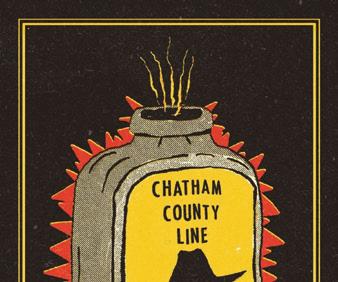

3/9 TH AN EVENING WITH YO LA TENGO
3/10 FR AN EVENING WITH YO LA TENGO
3/14 TU EMILY SCOTT



ROBINSON / ALISA AMADOR / VIOLET BELL
3/21 TU RIVERSIDE W/ THE CYBERIAN DUO
3/22 WE WHITE REAPER W/ MILITARIE GUN, MAMALARKY

3/24 FR ABBEY ROAD LIVE!
(BEATLES TRIBUTE)
3/25 SA ABBEY ROAD LIVE!
(BEATLES TRIBUTE) MATINEE
3/25 SA ARCHERS OF LOAF W/ TRUTH CLUB
3/26 SU ARCHERS OF LOAF W/ MJ LENDERMAN
3/28 TU WUNCMUSIC PRESENTS: IBEYI W/ OJERIME

3/29 WE CRANK IT LOUD PRESENTS: OUR LAST NIGHT / FAME ON FIRE / RAIN CITY DRIVE
4/2 SU THE RESIDENTS
4/3 MO JAWNY W/ WALLICE
4/4 TU JOYWAVE W/ ELIOT LEE

4/6 TH THE CHURCH
THE HYPNOGOGE ALBUM TOUR
4/7 FR DUSTER W/ WIDOWPEAK
4/15 SA BUILT TO SPILL
4/16 SU CAROLINE ROSE W/ HAMMYDOWN
4/17 MO MICHELLE ZAUNER PRESENTS: HER MEMOIR CRYING IN H MART
4/18 TU SAMIA W/ RALPHIE KENT
4/20 TH 47 EYEZ ON ME W/ LATE NOTICE ($7/$10)
4/21 FR THE DIP W/ BOULEVARDS
4/22 SA THE MOUNTAIN GOATS
4/23 SU THE MOUNTAIN GOATS W/ ADEEM THE ARTIST
4/24 MO THEO KATZMAN
4/25
3/3 FR BAILEN W/ ELIZABETH MOEN
3/4 SA SOUL GLO W/ CLOUD RAT, BACKSLIDER, OVERGROWN THRONE
3/5 SU MIKAELA DAVIS ( $15/$18)
3/10 FR BILMURI

3/11 SA CURTIS WATERS
3/13 MO RUNNNER W/ WAVEFORM*
3/16 TH DUCK W/ FLORENCIA & THE FEELING, ELORA DASH


3/21 TU CHEEKFACE W/ SAD PARK
3/24 FR MEDIUM BUILD W/ ZINADELPHIA
3/25 SA JERVIS CAMPBELL W/ THOMAS AUSTIN

3/26 SU NICOTINE DOLLS ($15/$17)
3/27 MO MAGIC GIANT ($18/$20)

3/28 TU CRANK IT LOUD PRESENTS: PHONEBOY
3/29 WE SHAWN MULLINS + LARRY CAMPBELL & TERESA WILLIAMS
3/31 FR WYATT EASTERLING W/ CAROLINE COTTER
4/3 MO ETRAN DE L’AÏR
4/4 TU FREE THROW W/ CAN’T SWIM, HEART TO GOLD, EARLY HUMANS
4/5 WE WIKI W/ AKAI SOLO, PAPO2OO4
4/7 FR JULIA., THE HOURGLASS KIDS

4/8 SA JPHONO1, JENNYANYKIND, MAYFLIES USA
4/9 SU HIGH VIS
4/12 WE THE BOBBY LEES
4/13 TH COCO & CLAIR CLAIR
4/14 FR HAPPY LANDING
4/15 SA DONOVAN WOODS & HENRY JAMISON W/ ISABEL PLESS
4/16 SU GARCIA PEOPLES & CHRIS FORSYTH
HAW RIVER BALLROOM (SAX)
3/20 MO NEW FOUND GLORY

W/ LEANNA FIRESTONE
4/22 SA ANDY SHAUF
W/ MARINA ALLEN
5/21 SU THE NEW PORNOGRAPHERS
RITZ (RALEIGH)
3/8 WE THEY MIGHT BE GIANTS
3/27 TU TENNIS – THE POLLEN TOUR W/ KATE BOLLINGER
5/10 WE AN EVENING WITH FEIST
5/27 SA BACKSEAT LOVERS
MOTORCO (DURHAM)
3/20 MO THE LEMON TWIGS W/ CHRIS STAMEY GROUP

3/ 21 TU SOULSIDE
W/ J ROBBINS (BAND)
3/27 MO AVEY TARE
5/1 MO UPSAHL

2/23 TH WARKA W/ THE AUXILIAY, UNO DOSE
2/24 FR ROYAL ARCTIC INSTITUTE, SHARK QUEST, PAUL SWEST
2/25 SA LEMON SPARKS, BRETT HARRIS W/ CARTER HODGE
3/2 TH: SAM GRISMAN PROJECT PRESENTS THE MUSIC OF GARCIA/GRISMAN
4/20 TH SAM BURCHFIELD & THE SCOUNDRELS
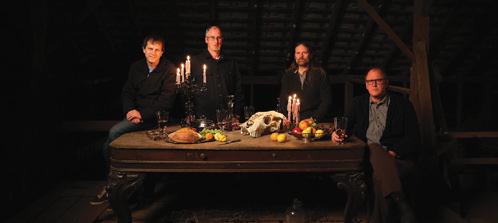
4/21 FR THE OLD CEREMONY W/ DISSIMILAR SOUTH
4/23 SU ANDMOREAGAIN PRESENTS: ACID DAD W/ WINE LIPS
5/10 WE SHAME
5/22 MO OFF! (RESCHEDULED)


6/5 MO FENNE LILY AND CHRISTIAN LEE HUTSON RED HAT AMPH (RALEIGH)
4/14 FR MT JOY


17 February 22, 2023 INDYweek.com
TU FRUIT BATS
TU
W/
5/3 WE
5/9 TU HOODOO GURUS 5/19 FR SUECO 5/27 SA THRICE W/ HOLY FAWN 5/28 SU PANCHIKO W/ HORSE JUMPER
LSD AND THE SEARCH FOR GOD 5/31 WE INDIGO DE SOUZA 6/16 FR WEDNESDAY W/ TENCI 6/25 SU JOSEPH 6/29 TH EELS 9/17 CIL PRESENTS: IGORRR, MELT BANANA, OTTO VON SCHIRACH 9/26 OSEES ($25 ADV/ $28 DAY OF) CAT'S CRADLE BACK ROOM MO 2/27 @CAT’S CRADLE JUNIOR BOYS FR 3/3 @CAT’S CRADLE BACK ROOM BAILEN TU 3/28 @CAT’S CRADLE IBEYI W/ OJERIME FR 3/3 @CAT’S CRADLE CHATHAM COUNTY LINE W/ CALEB CAUDLE MO 3/20 @HAW RIVER BALLROOM NEW FOUND GLORY W/ LEANNA FIRESTONE SOLD OUT SOLD OUT SOLD OUT SOLD OUT SOLD OUT SA 3/25 & SU 3/26 @CAT’S CRADLE ARCHERS
SOLD OUT SOLD OUT SOLD OUT SOLD OUT SOLD OUT SOLD OUT SOLD OUT SOLD OUT 4/27 TH PEDRO THE LION W/ ERIK WALTERS 4/28 FR KILL ALTERS W/ DELI GIRLS, MURDER PACT 4/29 SA CHESSA RICH ALBUM RELEASE 5/1 MO AUGUSTANA 5/3 WE DESTROYER ( SOLO) W/ THE REDS, PINKS & PURPLES 5/10 WE TRANSVIOLET W/ JAGWAR TWIN 5/16 TU ANNIE DIRUSSO W/ HANNAH COLE 5/22 MO MATTHEW LOGAN VASQUEZ W/ DANNY GOLDEN 5/27 SA WESTERMAN 6/25 SU JOE PUG ($25/$28) SOLD OUT CATSCRADLE.COM � 919.967.9053 � 300 E. MAIN STREET � CARRBORO SA 3/4 @CAT’S CRADLE BACK ROOM SOUL GLO CAT'S CRADLE
4/27 TH PEDRO THE LION W/ ERIC WALTERS 4/29 SA DAVID CROSS W/ SEAN PATTON 5/2
JAMES MCMURTRY
BETTYSOO ($25/$28)
YAEJI ($25/$28)
OF LOVE,
OF LOAF
Ancient and Abiding
Chapel Hill’s Jesse Ainslie pairs creative renewal and intellectual inspiration in new project Warka.
BY NICK MCGREGOR music@indyweek.com
Ancient Mesopotamian poetry, apocalyptic R&B, and academic second chances make strange bedfellows. For Chapel Hill native Jesse Ainslie, these threads intertwine in Warka, a new project that’s equal parts creative rejuvenation and spiritual reawakening.
It’s a far cry from the old-time country and blues of Ainslie’s childhood and the Americana he cut his teeth on as a guitarist for Castanets and Phosphorescent. Instead, Warka mashes up Tina Turner and the Blade Runner soundtrack, Nick Cave and The Temptations, Smokey Robinson and Kendrick Lamar—truly a “new beginning for an old mystery,” as the press release for the forthcoming debut album, Master Chaynjis, eloquently puts it.
“This is not lighthearted, whimsical music,” Ainslie tells INDY Week over coffee at Carrboro’s Open Eye Cafe on a recent warm Friday afternoon. Warka’s roots stretch back through 2020’s early-pandemic haze. Still, the project is suffused with the sincere hope that we can overcome our worst impulses and rediscover our authentic selves.
Living in a wildfire-blanketed Los Angeles in the winter of 2019, Ainslie began experimenting with synthesizers—always, he laughs, considered “a bad thing” in his past rock-oriented circles. He paired that musical exploration with long hours studying the ancient Near East: 100year droughts in Mesopotamia, palace intrigue among Egyptian pharaohs, and Sumerian iconography.
That December, Ainslie left Southern California for a job in upstate New York. His father, Scott, lived just across the state line in rural Vermont, so Jesse moved in (from “70 degrees to 11 degrees,” he remembers). But Dad’s three-bedroom house was empty; an ace old-time fiddler and blues guitar-
ist, Scott was still touring in those blissful pre-pandemic times.
Once COVID hit, the job evaporated, and Ainslie found himself with endless hours to fill. He sketched Sumero-Akkadian cuneiform scripts, fell down the fertile internet rabbit hole of free ancient-history classes, and holed up in an attic to learn new media and decipher MIDI grids.
“It was an attempt to get better at using this tool I was unfamiliar with but found beautiful—and a quest to unite something essential across time periods,” Ainslie says. He connected the societal upheavals of 2700 BCE that kneecapped major political organizations with the stranded freight ships of 2020 that snarled global commerce and threatened oncestable democracies.
But “people still baked bread, made music, told stories around the fire, and loved one another,” Ainslie says. “Things were OK. They weren’t great! But we survived. We’ve been through worse. We might die, but we can still live.”
He channeled that existential angst into Warka’s first finished songs, writing and commiserating with longtime friend and fellow antiquity enthusiast Brendon Massei.
“Philosophical thinking can reduce one’s anxiety about global affairs,” Ainslie says. “I paired that with a realist’s caution: What lessons can be learned from the ancient past? What lasts? And what adds to those things that last?”
Such deep thoughts were accompanied by an immersion in 1980s Black pop: Prince, Sade, and Tina Turner. Ainslie realized he was no longer comfortable with the sound—or even the linguistic description—of Americana.
“As a genre, it has a race problem,” he says. “It presupposes white heritage. I wanted to expand my personal understanding
of it—and reorient how I produce work in response to that.”
Notating synthesizer scores and mastering sequencer software stumped the longtime guitarist, though, and he decided the time was right to return to college. He’d taken a few classes at UNC-Chapel Hill in the past; moving home to North Carolina in August 2020, he reached out to the Friday Center for Continuing Education, which welcomed him back as a part-time undergraduate in September.
He started as a religious studies minor before declaring as a music composition major, figuring his rock ’n’ roll experience paired with formal training could lead to a teaching career.

“I want to nurture other artists and musicians,” he says. “Maybe give away the things that I’ve acquired.” On “We Got Lucky,” an upcoming single off Master Chaynjis, he sums it up even more beautifully: “We don’t want no afterlife / We don’t want no great beyond / Maybe go to school / Do something cool / Make a living for fucking once.”
Ainslie’s academic journey composing tangos and studying charangas mirrors his work with Warka. A course on Black Atlantic religion helped him recognize the link between sacred Yoruba traditions and diasporic art forms like clave, the rhythmic Afro-Cuban foundation of bossa nova and Latin jazz.
“That fundamental rhythm comes to the
New World through the slave trade,” Ainslie says, before becoming Dominican merengue, Brazilian candomblé, and “eventually ‘Hey Bo Diddley’ and ‘I Want Candy.’”
Even more seminal was Tina Turner’s 1984 album Private Dancer, which features instrumental backing from polymathic British rockers Dire Straits. “Tina talks about that period as revitalizing her spiritually,” Ainslie says. “One of the songs is written from the perspective of Nefertiti if she was reincarnated. I’m like, ‘That’s what I’ve been talking about!’”
Those permutations pop on Master Chaynjis, due out in April. Vast reverberations of industrial pop ricochet across “I’m in Love Again,” the first single (appropriately released on Valentine’s Day). Intricate chromatic melodies connect the two-part movement “Things Are Looking Up,” while blown-out beats undergird the dub-style “We Got Lucky.” Meanwhile, scorching guitars on “The Big One” recalls Bruce Springsteen’s supercharged 1980s rock.
It all adds up to a dizzyingly delicious first dish from Warka—digestible, yes, but profound enough to satisfy deep cravings. Master Chaynjis contains theme and variation, articulation, and syncopation. It also slaps, with soaring, sing-along choruses that might surprise anyone familiar with Ainslie’s older work.
“I grew up on Americana,” he says. “But I was a wolf in country clothing, and those
18 February 22, 2023 INDYweek.com M U S IC
Jesse Ainslie in his home studio
PHOTO BY BRETT VILLENA
WARKA, THE AUXILIARY, AND UNO DOSE Thursday, February 23, 8 pm | Cat’s Cradle Back Room | $10
clothes just didn’t quite fit.” That complicated past includes eight years of heavy drinking, which culminated in two DUIs and a six-month stint in Durham County Detention Facility in 2015. Ainslie got clean in a jail rehab program, however, and he’s remained sober for the last seven-plus years.
“My internal world changed when I was inside,” he says. “I found myself getting softer and trying to be gentle in this horrible place. The longer I was sober, the nicer I got. I could see how much pain everyone was in—the inmates, but also the people who worked there and spent 50–60 hours a week in jail.” He recalls a story from his first days free: “I told my friend Dan, ‘I feel like I’ve really changed.’ And he said, ‘No man, you’re just back to the person you were when we first met. You’ve just cut away a thing—you haven’t added something new.’”
Today, Ainslie clearly relishes this fresh path. He’s altered the way he writes, the way he sings in his deep, resonant voice— even the way he plays guitar. “I’m trying to align with the robotic rhythm of the synthesizer without being too perfect,” he says. “I started off going back to R&B. Now I’m going forward into the future.”

Before Master Chaynjis even drops, Ainslie is already looking ahead to a new phase informed as much by a collective spirit as his own self-discovery. Bandmates Brad Porter (drums) and Spencer Lee (bass) have infused Warka’s synth-based sound with their own influences (1960s Stax soul and doom/drone metal, respectively).
“I got into music because I like volume and movement,” Ainslie says, “so it’s refreshing to be in an ensemble and have somebody push you around again.”
He likens it to capillary action—the gravity-defying, photosynthetic push-pull of liquid up through a plant’s roots and into its stems.
“You’re never done growing,” Ainslie says. “With Warka, I’m drawing power and giving it away. I’m opening myself up and refreshing my tank with the feedback Spencer and Brad give me.”
It’s this mutual motion that animates Ainslie the most. “Ever since the passing of Tom Verlaine of Television, I’ve rediscovered my punk ethos,” he says. “I’m thinking, ‘What if I’m only talking to one person with my music?’ Tom was the first person who made me feel like I was capable of being in a music scene. And that has changed the way I behave, on stage and on record. What I’m trying to share is my vulnerability so that you can feel comfortable with yours.”

Grinning, he adds, “I’m earnestly falling in love with human beings again.” W
RECYCLE THIS PAPER RECYCLE THIS PAPER RECYCLE THIS PAPER RECYCLE THIS PAPER RECYCLE THIS PAPER RECYCLE THIS PAPER RECYCLE THIS PAPER RECYCLE THIS PAPER RECYCLE THIS PAPER RECYCLE THIS PAPER RECYCLE THIS PAPER RECYCLE THIS PAPER RECYCLE THIS PAPER RECYCLE THIS PAPER RECYCLE THIS PAPER RECYCLE THIS PAPER RECYCLE THIS PAPER RECYCLE THIS PAPER RECYCLE THIS PAPER RECYCLE THIS PAPER RECYCLE THIS PAPER RECYCLE THIS PAPER RECYCLE THIS PAPER
19 February 22, 2023 INDYweek.com
Hear about that great new BBQ place. Visit INDYWeek.com for restaurant reviews and food & drink news.
C U LT U R E CA L E N DA R
Please check with local venues for their health and safety protocols.
stage
Best of Enemies
$23. Feb. 10-26, various times.
Umstead Park UCC, Raleigh.
Switchyard
Theatre Company
Presents: Present Laughter $25. Feb. 23–Mar. 5, various times. Durham Arts Council, Durham.
art
Meshroom: An Open Dancefloor to Rewild Thought and Movement
Thurs, Feb. 23, 7 p.m. The Ark Dance Studio, Durham. Riverdance $30+. Feb. 24-26, various times. DPAC, Durham.
music
Brandi Carlile: A Special Solo Performance
$594+. Wed, Feb. 22, 8 p.m. DPAC, Durham.
Lotus $25. Wed, Feb. 22, 9 p.m. Lincoln Theatre, Raleigh.
Martin Bejerano
#CubanAmerican Trio $25. Wed, Feb. 22, 8 p.m. Sharp Nine Gallery, Durham.
Telltale $12. Wed, Feb. 22, 7 p.m. Local 506, Chapel Hill.
Below Decks: Ani Klang, DJ Pacifier, Chainletter, and Personal Loss $10.
Thurs, Feb. 23, 8 p.m. The Fruit, Durham.
Scivic Rivers $10. Thurs, Feb. 23, 8 p.m. The Pinhook, Durham.
Tower of Power $48+. Thurs, Feb. 23, 8 p.m. The Carolina Theatre, Durham.
Warka Music Video Release Party $10. Thurs, Feb. 23, 8 p.m. Cat’s Cradle Back Room, Carrboro.
North Carolina Symphony: Mozart Requiem $21+. Feb. 24-25, various times. Duke Energy Center for the Performing Arts, Raleigh.
7 Years of Raund Haus: 7th Anniversary Party
$5. Fri, Feb. 24, 8 p.m. Rubies on Five Points, Durham.
Blue Footed Boobies / Riverdawg $10+. Fri, Feb. 24, 7 p.m. Transfer Co. Food Hall Ballroom, Raleigh.
An Evening with Gregory Porter $35+. Fri, Feb. 24, 8 p.m. Raleigh Memorial Auditorium, Raleigh.
Futurebirds SOLD OUT. Fri, Feb. 24, 8 p.m. Cat’s Cradle, Carrboro.
The Georgia Thunderbolts $15.
Fri, Feb. 24, 8 p.m. Motorco Music Hall, Durham.
Keith Ganz Quartet
$25. Fri, Feb. 24, 8 p.m. Sharp Nine Gallery, Durham.
Red Clay Saxophone Quartet Fri, Feb. 24, 8 p.m. Baldwin Auditorium, Durham.
The Royal Arctic Institute / Shark Quest / Paul Swest $10. Fri, Feb.24, 8 p.m. Cat’s Cradle Back Room, Carrboro
Sierra Hull & Justin Moses Live in Concert $85+.
Fri, Feb. 24, 7:30 p.m. Duke Energy Center for the Performing Arts, Raleigh.
Syncopated Gold: Jukebox Jazz $35+. Fri, Feb. 24, 7:30 p.m. Theatre Raleigh, Raleigh.
Alessio Bax $10+. Sat, Feb. 25, 8 p.m. Baldwin Auditorium, Durham.
Grace Bartow Live Sat, Feb. 25, 4 p.m. Durty Bull Brewing Co, Durham.
K. Michelle: I’m the Problem Tour $53+. Sat, Feb. 25, 8 p.m. The Ritz, Raleigh.

Urinetown, the Musical $30. Feb. 23-26, various times. Stewart Theatre, Raleigh.
Jagged Little Pill $30+. Feb. 28–Mar. 5, various times. DPAC, Durham.
Artist Happy Hour
Thurs, Feb. 23, 6 p.m. Artspace, Raleigh.
Workshop: The Drawing Room with Bill Thelen
Thurs, Feb. 23, 6 p.m. Gregg Museum of Art & Design, Raleigh.
Paint like Van Gogh Workshop $77+. Sat, Feb. 25, 11 a.m. Van Gogh Immersive Experience, Raleigh.
Lemon Sparks / Brett Harris $12.
Sat, Feb. 25, 8 p.m. Cat’s Cradle Back Room, Carrboro.
Songwriters in the Round $15. Sat, Feb. 25, 7 p.m. The Eno House, Durham. The Special Consensus $25.
Sat, Feb. 25, 8 p.m.
Community Church of Chapel Hill
Unitarian Universalist, Chapel Hill.
Thelma and the Sleaze $12. Sat, Feb. 25, 7:30 p.m.
The Pinhook, Durham.
Visions of Atlantis $20. Sat, Feb. 25, 8 p.m. Local 506, Chapel Hill.
Weyes Blood: In Holy Flux Tour
SOLD OUT. Sat, Feb. 25, 8 p.m. Cat’s Cradle, Carrboro.
Witt Lowry $20. Sat, Feb. 25, 8 p.m. Motorco Music Hall, Durham.
Crisa Sun Feb. 26, 8 p.m. Rubies on Five Points, Durham.
dvsn: Working on My Karma Tour $39+. Sun, Feb. 26, 8 p.m. The Ritz, Raleigh.
Eduardo’s Noche Flamenca $23. Sun, Feb. 26, 7 p.m. Peak of the Vine, Apex.
Step Friends $10. Sun, Feb. 26, 8 p.m. Local 506, Chapel Hill.
West Eastern Divan Ensemble $10+. Sun, Feb. 26, 7 p.m. Baldwin Auditorium, Durham.
Junior Boys $20. Mon, Feb. 27, 8 p.m. Cat’s Cradle, Carrboro.
’68 $15. Tues, Feb. 28, 7:30 p.m. Local 506, Chapel Hill. North Carolina Jazz Repertory Orchestra Concert $25. Tues, Feb. 28, 8 p.m. Sharp Nine Gallery, Durham.
20 February 22, 2023 INDYweek.com
PHOTO COURTESY OF THE RITZ
K. Michelle performs at the Ritz on Saturday, February 25.
Show


21 February 22, 2023 INDYweek.com page
Frank Hyman: How to Forage for Mushrooms without Dying Thurs, Feb. 23, 6:30 p.m. Letters Bookshop, Durham.
Nic Brown: Bang Bang Crash Thurs, Feb. 23, 5:30 p.m. Flyleaf Books, Chapel Hill.
Gillian McDunn: When Sea Becomes Sky Sat, Feb. 25, 3 p.m. Quail Ridge Books, Raleigh.
Frank Hyman reads from How to Forage for Mushrooms without Dying at Letters Bookshop on Thursday, February 23.
screen
PHOTO BY BRETT VILLENA
People $8. Wed, Feb. 22, 7 p.m. The Carolina Theatre, Durham.
Grandmaster: The Vic Moore Story with Q&A SOLD OUT. Fri, Feb. 24, 7 p.m. The Cary Theater, Cary.
C U LT U R E CA L E N DA R like to plan ahead? FOR OUR COMPLETE COMMUNITY CALENDAR: INDYWEEK.COM
to ahead? C U LT U R E CA L E N DA R
Cocaine Bear Movie Party $18. Sat, Feb. 25, 3:45 p.m. Alamo Drafthouse Cinema, Raleigh.
like
In-Store Shopping Curbside Pick Up
720 Ninth Street, Durham, NC 27705
Hours: Monday–Saturday 10–7 | Sunday 10–6



su | do | ku
© Puzzles by Pappocom
There is really only one rule to Sudoku: Fill in the game board so that the numbers 1 through 9 occur exactly once in each row, column, and 3x3 box. The numbers can appear in any order and diagonals are not considered. Your initial game board will consist of several numbers that are already placed. Those numbers cannot be changed. Your goal is to fill in the empty squares following the simple rule above.

P U Z Z L E S
If you just can’t wait, check out the current week’s answer key at www.indyweek.com, and click “puzzles page” at the bottom of our webpage.


If you just can’t wait, check out the current week’s answer key at www.indyweek.com, and click
“puzzles page”.
Best of luck, and have fun! www.sudoku.com
22 February 22, 2023 INDYweek.com INDY CLASSIFIEDS classy@indyweek.com
week’s puzzle level: 02.22.23 solution to last week’s puzzle # 29 29 # MEDIUM 7 4 2 9 8 5 458 3 5 2 9 7 2 8 4 1 297 6 1 4 4 1 5 2 3 5746291 8 2 8639145 7 1 4957863 2 4 3521978 6 8 9175632 4 # 30 30 # MEDIUM 4 9 2 78 5 3 8 2 1 7 5 7 9 9 6 3 4 3 3 76 8 5 3 1 14972865 3 78546329 1 62319548 7 26491783 5 31758492 6 # 31 31 # MEDIUM 6 3 4 2 8 3 9 1 89 2 9 4 45 2 2 8 7 5 8 4 1 9 162958 4 3 7 349172 6 5 8 875643 9 2 1 531489 2 7 6 926317 5 8 4 # 32 32 # MEDIUM 95 8 1 9 8 2 7 6 7 2 9 5 3 4 1 9 3 8 9 4 1 7 63 8 7394 6 512 8 5169 8 243 7 4827 1 365 9 3745 9 628 1 8951 2 734 6
this



23 February 22, 2023 INDYweek.com INDY CLASSIFIEDS classy@indyweek.com C L A S S I F I E D S HEALTH & WELL BEING 919-416-0675 www.harmonygate.com RECYCLE THIS PAPER LAST WEEK’S PUZZLE To adver tise or feature a pet for adoption, please contact adver tising@indyweek.com To adver tise or feature a pet for adoption, please contact adver tising@indyweek.com To adver tise or feature a pet for adoption, please contact adver tising@indyweek.com To adver tise or feature a pet for adoption, please contact adver tising@indyweek.com To adver tise or feature a pet for adoption, please contact adver tising@indyweek.com






































































 By Jasmine Gallup, p. 8
By Jasmine Gallup, p. 8
















 Raleigh | Durham | Chapel Hill
February 22, 2023
Raleigh | Durham | Chapel Hill
February 22, 2023


















 BY DAN RUCCIA music@indyweek.com
BY DAN RUCCIA music@indyweek.com



































